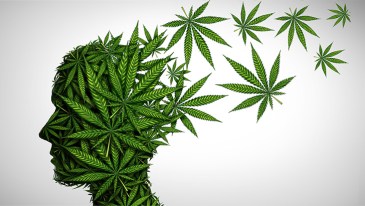State-level marijuana legalization laws are not associated with a statistically significant increase in rates of psychosis-related health outcomes, according to data published in the Journal of the American Medical Association (JAMA) Network Open.
A team of Stanford University investigators evaluated the relationship between the adoption of statewide legalization laws and rates of psychosis-related health care claims among a cohort of over 63 million privately insured individuals followed from 2003 to 2017.
Authors reported: “This study is the first and largest, to our knowledge, to quantify the association of medical and recreational cannabis policies with rates of psychosis-related health care claims across US states. … [W]e did not observe a statistically significant association of state cannabis policy level with overall rates of psychosis-related diagnoses or prescribed antipsychotics. … As US states continue to legalize the use, production, promotion, or sale of cannabis, continued examination of the implications of state cannabis policies for psychotic disorders may be informative, particularly with study designs that yield precise estimates in high-risk population subgroups.”
The Stanford study comes just days after the release of a separate paper, published online in the journal Psychological Medicine, reported no greater rates of psychosis among twins residing in legal cannabis states as compared to their siblings who did not.
NORML’s Deputy Director Paul Armentano called the findings “reassuring,” but he also cautioned that there are certain populations, including those with a predisposed vulnerability to psychosis, that appear to be more sensitive to cannabis’ psychotropic effects.
Although the use of cannabis and other controlled substances, particularly tobacco, tends to be more common among those with psychotic illnesses, studies indicate that lifetime incidences of marijuana-induced psychosis are relatively rare among those who do not already have a prior diagnosis of a psychiatric disease.
According to one recently published study, fewer than one-half of one percent of cannabis consumers had ever reported experiencing psychotic symptoms requiring medical intervention – a percentage that is lower than the rate associated with alcohol.
Another recent analysis of subjects consuming cannabis for therapeutic purposes similarly reported that patients are at “low” risk for psychiatric hospitalizations resulting from their marijuana use. In that study, investigators assessed marijuana-related hospitalizations among a cohort of over 23,000 subjects over a median period of 240 days. During that time, only 26 patients were hospitalized explicitly because of “mental or behavioral disorders due to the use of cannabis.”
Full text of the study, “State cannabis legalization and psychosis-related health care utilization,” appears in JAMA Network Open. Additional information on cannabis and mental health is available from NORML’s white paper, ‘Cannabis, Mental Health, and Context: The Case for Regulation.’


